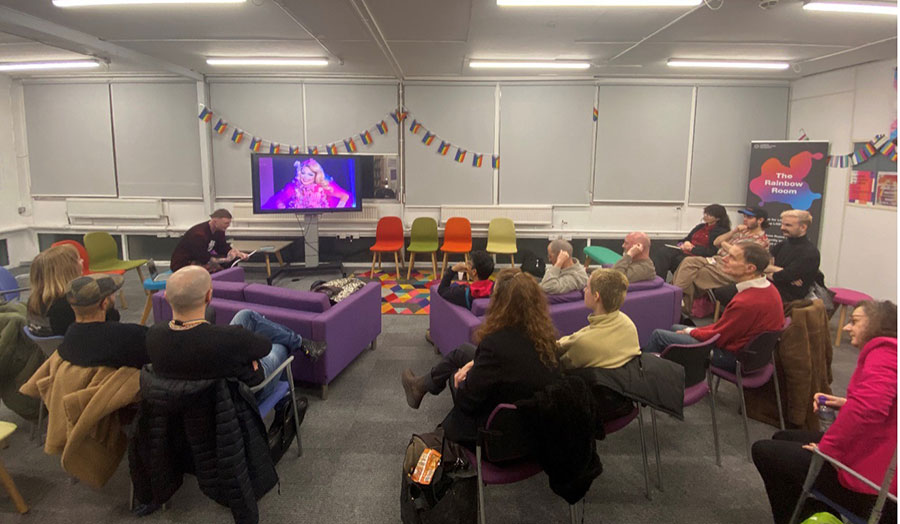8 December 2023
On 8 December 2023, the Rainbow Room and the Gender and Sexual Diversity Research Group hosted an event to celebrate the launch of Dr Charlie Sarson’s recent book publication, RuPaul’s Drag Race and the Cultural Politics of Fame, co-edited with Professor John Mercer and Dr Jamie Hakim, which was published in October 2023 by Routledge.
Dr Charlie Sarson (he/him) works in Student Recruitment and Business Development at London Metropolitan University. Charlie completed his PhD at Birmingham City University in 2020, with his thesis exploring the ways in which gay men construct and perform masculinity on hook-up apps. He has published in journals such as Journal of Gender Studies, Porn Studies and Celebrity Studies, and has peer-reviewed for journals such as Sexualities, Journal of Gender Studies and Culture, Health and Sexuality. His research interests include gender, sexuality, gay men and masculinities, representations of sex among gay men, and digital research methods. He is a member of London Metropolitan University’s Gender and Sexual Diversity research group.
The launch event hosted Charlie and co-editors Professor John Mercer (he/him, Professor of Gender and Sexuality, Birmingham City University, UK) and Dr Jamie Hakim (he/him, Lecturer in Culture, Media and Creative Industries, King’s College London, UK). The event was chaired by Wendy Sloane (she/her, Principal Lecturer in Creative Media and Digital Technologies, London Metropolitan University, UK).
RuPaul’s Drag Race and the Cultural Politics of Fame explores the connections between drag stardom and contemporary sexual and cultural politics in the RuPaul’s Drag Race franchise. With Drag Race alumni achieving fame in fields such as music, fashion, theatre and beyond, this edited collection interrogates the relationships between gender, sexuality, performance, identity and celebrity culture that lie at the very heart of the show. The contents of the book were initially published as a special edition of the Routledge journal Celebrity Studies, which Routledge later decided to publish as a book due to its popularity with academics, researchers and advanced students of media and cultural studies.
Opening the event, John outlined the initial rationale for the special edition that later became the book, recalling a series of personal thoughts and events that indicated the charting of drag’s shift from its historically outsider position with radical roots in gay male subcultures to entering the mainstream of today. RuPaul can now be found selling products to suburbia on shopping channels such as QVC, and queens from RuPaul’s Drag Race sell out venues with an audience no longer mainly comprised of gay men. The culmination of these personal musings, and the development of research questions, happily coincided with an email from the editors of Celebrity Studies, and Jamie and Charlie were called on board to develop and ultimately co-edit the project.
Jamie then discussed the arguments of his chapter in the book, co-written with his colleague Dr Zeena Feldman (Senior Lecturer in Digital Culture, King’s College, London, UK). They trace the neoliberalisation of drag via RuPaul’s Drag Race, identifying anticapitalist acts of the past to present day (such as The Cockettes in the USA and David Hoyle in the UK), to the more homonormative presentation of drag in Drag Race, and also discussed the role of social media in aiding this transition and of queens becoming brands subsumed into a capitalist and homonormative framework.
Charlie followed this by providing a brief synopsis of each other chapter in the book, written by academics from within the UK and internationally, before coming on to discuss the final chapter in the book that he co-wrote with John. In their chapter, ‘Fifteen seconds of fame: RuPaul’s Drag Race, camp and ‘memeability’’, Charlie and John argue that in a contemporary media landscape, reality TV stars can be catapulted to celebrity status via the sharing of memes, GIFs and viral videos by fans online. This path to fame deviates from more established routes, such as the three identified by Chris Rojek of ascribed, achieved and attributed, instead blurring these categories to the same ends of stardom. Identifying ‘memeability’ as a set of conditions that media such as a short clip must meet in order to go viral, Charlie and John focus in on camp as one specific quality, arguing that camp’s tendency towards irony, aestheticism, and its response to ‘instant character’ makes it a potent vehicle through which online virality can be achieved and celebrity status can be enhanced and sustained – even when the queens featured in the memes or GIFs did not do particularly well in the show.
The launch event concluded with a lively and engaged Q&A session, with in-person and online attendees asking questions relating to the show’s shaky history in allowing trans and non-binary contestants, its international franchises, and more inclusive shows of a similar nature such as Dragula. It’s clear to Charlie, John and Jamie that there is scope for a much larger body of research to be conducted, and the book will hopefully serve as a valuable foundation for such research. The conversations continued over drinks following the launch, allowing an opportunity for networking between staff, students and other interested parties external to the University.
Ebooks and hardback copies of the book can be purchased via Routledge.

Image: Author, speakers and audience at the event in the Rainbow Room
Please contact the Research and Postgraduate Office if you have any questions about this or any of our other events.
To receive notifications of future events, please follow the Research and Postgraduate Office on Eventbrite.
